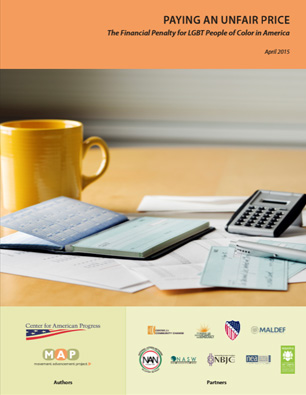The Bottom Line
Paying an Unfair Price: The Financial Penalty for LGBT People of Color in America documents how systemic failures to protect some students, recognize diverse families, and protect people from discrimination drive and trap LGBT people of color into a devastating cycle of poverty. The report details the ways in which a wide array of legal failures, combined with health and wealth disparities faced by people of color in general, result in higher poverty rates and increased economic insecurity for America’s 3 million LGBT people of color.
- The Law Fails to Protect LGBT People of Color and Their Families from Discrimination. Anti-LGBT laws that harm the financial well-being of LGBT people disproportionately affect LGBT people of color, resulting in lower incomes and making it harder to save for the future or to cover basic necessities. In other cases, these same legal inequalities burden LGBT people with higher costs for essentials like housing, healthcare, health insurance, and education.
- The Law Fails to Recognize LGBT Families. LGBT people of color are more likely to be raising children than white LGBT people, and so the denial of marriage and legal parenting ties particularly harms LGBT families of color and undermines their financial stability. Among those harms: higher healthcare costs or the unfair denial of health insurance, lack of access to safety-net programs, higher taxes, the inability to access Social Security retirement and disability programs, and more.
- The Law Fails to Protect LGBT Students, in Particular LGBT Students of Color. Upon entering the education system, bullying, harassment and violence together create key barriers to education for LGBT students of color. Barriers of race, sexual orientation, and gender identity are compounded in ways that can make it more difficult to obtain an affordable, quality education.
Paying an Unfair Price: The Financial Penalty for LGBT People of Color in America includes recommendations to reduce the unfair financial penalties experienced by LGBT people of color because of their sexual orientation or gender identity, as well as recommendations to address the systemic and persistent disparities that harm the economic security of people of color in the United States.
Paying An Unfair Price: The Financial Penalty for LGBT People of ColorDownload
Recommended citation:


